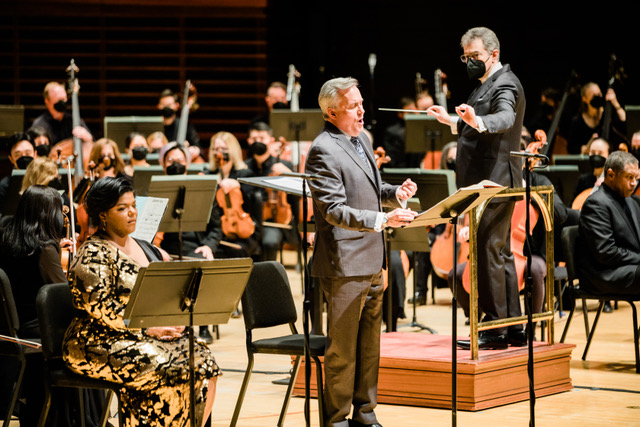 United States Walker, Stravinsky: Soloists, Opera Philadelphia Orchestra and Men of the Chorus / Corrado Rovaris (conductor). Opera Philadelphia, Verizon Hall, Philadelphia, 21.1.2022. (RP)
United States Walker, Stravinsky: Soloists, Opera Philadelphia Orchestra and Men of the Chorus / Corrado Rovaris (conductor). Opera Philadelphia, Verizon Hall, Philadelphia, 21.1.2022. (RP)

George Walker – Lilacs
Soprano – Tiffany Townsend
Stravinsky – Oedipus Rex
Oedipus – William Burden
Jocasta – Rehanna Thelwell
Creon / Messenger – Mark S. Doss
Tiresius – Jonathan Lemalu
Shepherd – Ethan Burck
Narrator – Charlotte Blake Alston
The only time that I saw anything remotely related to Sophocles’ Oedipus Rex in a theater was by coincidence in Philadelphia. It was nothing as highbrow as Stravinsky’s opera-oratorio, even though the performance was at the classy Academy of Music, but rather Oedipus Tex by P. D. Q. Bach, the alter ego of the American musical satirist Peter Schickele. It was a laugh a minute following the adventures of Tex in Thebes Gulch. One memorable line: ‘You may have heard of my brother, Rex’.
Opera Philadelphia’s dramatically taut and musically compelling concert performance of Stravinsky’s Oedipus Rex, an opera-oratorio about Tex’s brother, was anything but funny. The opening measures were terrifying: the men of the chorus sang ‘the plague is upon us’, accompanied by violent thrusts from the orchestra. No one knows how to put an end to the plague, and the populace is consumed by fear and anger. There’s nothing like being in the midst of a pandemic to make this ancient Greek myth have a contemporary bite.
Stravinsky composed Oedipus Rex when he was living in France in the mid-1920s. Scored for speaker, soloists, male chorus and orchestra, it was one of his first forays into Neoclassicism as he closed the book on the Russian style that had brought him fame through his revolutionary ballets: The Firebird, Petrushka and The Rite of Spring. Jean Cocteau wrote the libretto for Oedipus Rex in French, which Stravinsky had translated into Latin, with instructions that the narration be given in the language of the audience.
Cocteau relates the story of Oedipus, the unfortunate man who unwittingly killed his father and married his mother in terse, gripping prose. The oracle has revealed that the murderer of Laius, who was king of Thebes before Oedipus, is in Thebes and has brought plague to the city. He must be cast out for it to abate.

Jocasta, Laius’s widow and Oedipus’s wife, blithely dismisses the prophesy – oracles always lie – but when confronted by the truth commits suicide. Overcome with remorse, Oedipus blinds himself and is sent into exile to the accompaniment of a surprisingly soothing chorus with which Stravinsky ends the work.
Every word from the narrator, Charlotte Blake Alston, instilled mystery and dread as the saga unfolded. Her poise and detachment added to the tension that builds relentlessly.
William Burden’s Oedipus had all the smugness of a politician attempting to bluff his way through a public relations snafu. Watching that air of insouciance dissipate as he learned of his true parentage heightened the emotional impact of Oedipus’s fall from grace. The dramatic intensity of Burden’s characterization was equaled in his forthright, clear, resonant tenor.
Rehanna Thelwell’s imperious, smug Jocasta followed a similar downward trajectory, as her haughty dismissals of the oracle’s revelations were gradually replaced by horror, if not exactly remorse. Regal becomes Thelwell both dramatically and vocally, as did the Verdian style in which Stravinsky composed Jocasta’s aria.
The composer cast Creon musically in the style of Handel, which suited bass-baritone Mark S. Doss’s eloquent delivery and resonant voice. Bass Jonathan Lemalu bristled with indignation as he was forced to speak and thus reveal that the murderer of the king was himself a king. Promising young tenor Ethan Burck sang well as the shepherd who had found Oedipus as a baby abandoned in the mountains.
The men of the Opera Philadelphia Chorus were outstanding, singing with precision and impressive sound. Under Corrado Rovaris’s baton, the orchestra performed Stravinsky’s brilliant score with equal authority and emotion.
George Walker’s Lilacs for soprano and orchestra opened the concert. Born in Washington, DC, Walker was the first Black graduate of Philadelphia’s Curtis Institute of Music. His music for Lilacs earned him the distinction of being the first African-American composer to receive the Pulitzer Prize for Music in 1996. In spite of his accomplishments, Walker faced racism and discrimination throughout his career, he but lived to see his music performed by orchestras the world over.
In Lilacs, Walker set four stanzas from Walt Whitman’s poem, When Lilacs Last in the Dooryard Bloomed, to commemorate the passing of tenor Roland Hayes. Born a slave in Georgia, Hayes went on to become the first Black classical musician to make a commercial recording, appear with a major American symphony and perform for the British royal family. Whitman’s poem is itself an elegy reflecting on the assassination of President Abraham Lincoln.
Tiffany Townsend, who like Walker attended Curtis, was the soprano soloist. With her luscious, voice, immaculate diction and keen sense of drama, Townsend captured both the poignancy of Whitman’s text and the sense of wonder that Walker instilled in the musical depictions of the symbols of the poet’s grief – purple lilacs pointing skyward, birds whose song is the soul’s voice and the Western Star which symbolizes Lincoln himself.
This was the first performance by the Opera Philadelphia indoors with an audience in 720 days. The company managed to play it safe and stay afloat during these difficult times, presenting live outdoor performances throughout the city and producing, as well as commissioning, innovative and exciting operas on film. Philadelphia will have to wait until late April, however, for the return of grand opera with Verdi’s Rigoletto.
Rick Perdian
To watch a free stream of Opera Philadelphia’s 21 January 2022 performance of Walker’s Lilacs and Stravinsky’s Oedipus Rex, click here.
